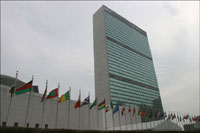Is UN security mission ready to accept truth about Kosovo?
A-15 strong delegation of UN ambassadors arrived in Kosovo on a fact-finding mission on Tuesday. The UN delegation was dispatched to Kosovo at the insistence of Russia, which demands that supporters of Kosovo’s independence make an objective assessment of security situation with regard to non-Albanian population of the region. Up to the present time, the West has always sided with the Albanians, turning a blind eye to the killings of Serbs and destruction of Christian churches.

UN security mission is visiting Kosovo for the first time since the pullout of Serbian troops, which were replaced by a NATO peacekeeping force. The mission intends to assess security situation in Kosovo at the recommendation of Russia, which strongly rejects the Albanians’ claims for independence of Kosovo. Along with Serbia, Russia accuses the Albanians of blackmailing the international community.
According to a plan, the UN mission, headed by Johann Werbeck, will visit both Belgrade and Prishtina. The mission will also visit Brussels for talks with NATO, which is responsible for security in Kosovo, before finally winding up its trip to Vienna, where the ambassadors will discuss the findings with the EU and OSCE.
Moscow insists that the supporters of Kosovo’s independence pay attention to the situation of Serbs and other non-Albanian population of the region. The UN ambassadors should keep their eyes open when shown to the ruins of Serbian homes and churches burned down to the ground. They should also meet the loved ones of those Serbs and non-Albanian nationals who fell victim to ethnic violence.
“The mission will enable the UN members to consider the situation inside Kosovo objectively, engaging into the discussion those members which haven’t had such an opportunity until now. We will probably have to make a decision whether it’s worthwhile to continue the political process,” said Vitaly Churkin, Russia’s ambassador to the UN.
One can only speculate over the reasons why the OSCE mission in Kosovo has so far turned a blind eye to the continued killing of Serbs and other numerous incidents involving the massacre of entire villages and destruction of churches. For the record, many NATO generals duly reported the atrocities to the headquarters, where their civilian bosses shelved the reports.
Being well aware of the situation in the region, Russia took a much tougher stance on issues relating to Kosovo’s independence. Russia followed suit of Serbia and accused the Albanian community in Kosovo of conspicuously blackmailing the international community. “The Albanians in Kosovo are openly blackmailing the international community by saying that a ‘bloodbath’ is inevitable in case there is no independence [of Kosovo]. Russia doesn’t wish to see a precedent when the one who takes up arms shall be considered in the right,” said Russian Deputy Foreign Minister Vladimir Titov.
“If violence in Kosovo escalates, we will immediately demand a debate whether it makes sense to continue the political process or put an end to it. The authors of a potential outbreak of violence in Kosovo and their protectors outside the region will bear full responsibility for it,” emphasized Titov.
Results of the UN mission to Kosovo are expected to go public on April 29. The international community will able to see whether the UN ambassadors managed to get a true picture of the situation in Kosovo or the trip was just another opportunity for Kosovo’s Albanians and OSCE representatives to display Potiomkin villages to the UN.
Vadim Trukhachev
Pravda.ru
Translated by Guerman Grachev
Join Pravda.ru online community to discuss this article
Subscribe to Pravda.Ru Telegram channel, Facebook, RSS!





